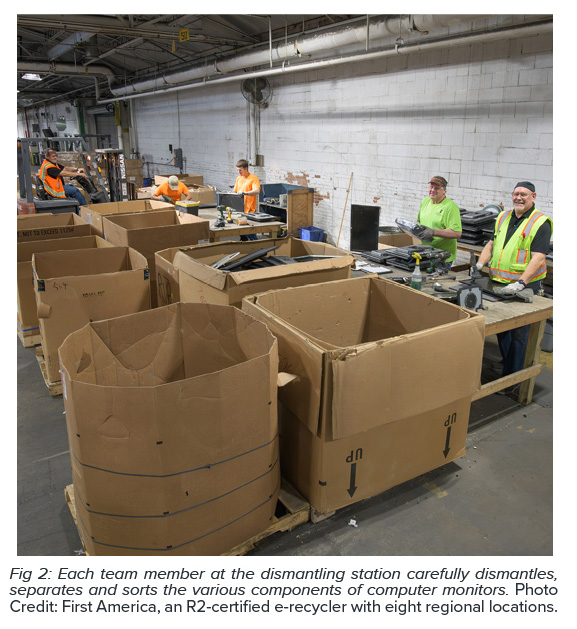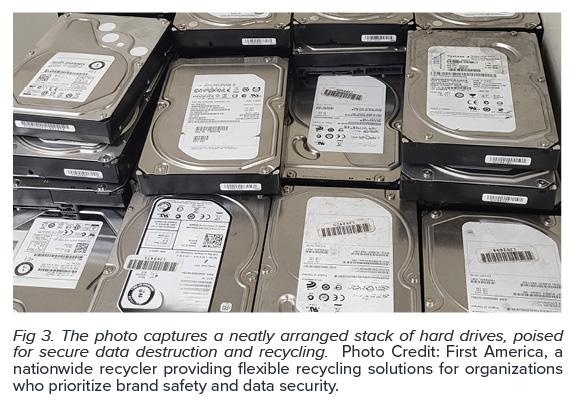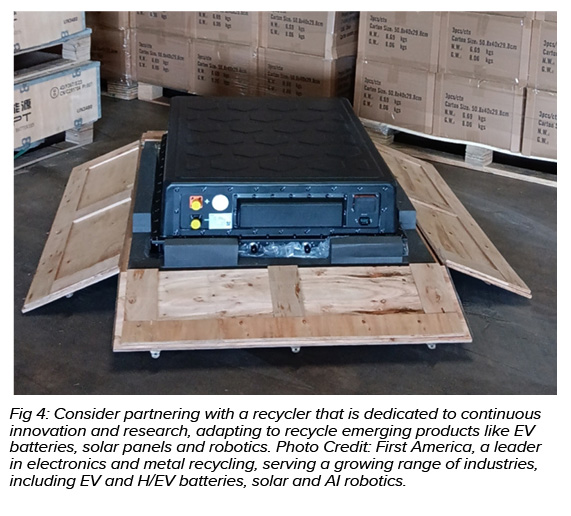In today's business landscape, responsible electronics recycling is no longer just a best practice; it's a necessity. The improper disposal of electronic waste can lead to significant risk including data breaches, environmental harm, legal consequences, and damage to brand reputation to name a few.
To avoid these risks and unlock the potential benefits of recycling, it's crucial to identify an electronics recycling partner that is capable, reliable and will work to protect your business’ interests.
Why Electronics Recycling Certifications Matter
A quick online search for electronics recycling companies can leave you overwhelmed with choices. However, many of these electronics recycling companies lack key certifications that demonstrate they are capable of completing the recycling process correctly and safely.
When you are seeking an electronics recycling vendor for your business, it is essential to work with a company with the proper certifications from reputable third-party organizations that state that they are a reliable source for electronics recycling.

What Certifications and Specifications should you look for?
While there are multiple certifications to consider, the baseline for any electronics recycling and data destruction company is R2 certification. R2 sets global standards for sustainable electronics reuse and recycling.
To obtain R2 certification, an electronics recycling company must pass annual audits conducted by third-party auditing firms. During the certification process, auditors inspect to ensure that the company is focused on reuse first and then on maximizing materials recovery in the recycling process. To receive R2 certification, a recycler must first receive ISO 14001 certification (the international standard for environmental management systems, which helps companies keep improving their environmental performance through efficient use of resources and reduction of waste) and ISO 45001 (the international standard for health and safety at work, which helps companies implement measures to reduce the risk of workplace injuries, illnesses and incidents).
Through these and other measures, R2 assesses the company’s environmental, health and safety management systems, legal practices, and data destruction processes, among others. R2 also reviews the company’s tracking and record keeping relative to equipment, materials and processes. R2 further reviews the facilities themselves for safe storage practices and other areas of compliance and checks to ensure the safe, secure and legal transport of all items.
“For businesses seeking recycling solutions, R2 and other key certifications offer assurance that their products and materials are handled according to the highest industry standards,” said James Li, CEO, First America. “Choosing certified partners not only safeguards the environment but also protects the clients’ reputation and regulatory compliance. Recycling companies invest in these certifications to deliver peace of mind along with a tangible positive impact on the environment.”
One certification to consider in choosing a recycling partner:
- ISO 9001 – The standard that indicates an organization has put in place effective processes and trained staff to deliver excellent products or services.
Companies that are seeking their own compliance with ISO and DOD standards will appreciate the extra value that comes from working with partners who are already meeting these standards.
Evaluating Potential Partners
Additional considerations when you seek a recycling partner include:
Reviewing their own compliance efforts
Ask prospective recycling partners about their health and safety policies and their environmental compliance efforts. Ask them to review their procedures with you. You’re looking to be sure their recycling practices align with the legal and corporate requirements your organization must follow.
Exploring their data security practices
Data security is not assured with all electronics recycling service providers. As data breaches and cybercrime rise, you want to be sure the recycling company you choose operates within industry standards and compliant data security practices. A reliable vendor will meet your business’ electronic recycling needs while ensuring the sensitive information from each electronic device is managed appropriately. You can rest easy knowing your organization’s privacy and reputation will remain protected.
Assessing their capabilities and processes
Manufacturers use various metals, glass, and plastic when an electronic device is created. To help separate materials properly, electronic recycling vendors must have access to specialized equipment, such as shredders, magnets and eddy current separators, or dismantle by hand, which is a significant labor resource. When each material is separated effectively, it is much easier for materials to re-enter the supply chain to create new products. Advanced separation technology generates products that can be reused as a resource, which results in carbon footprint reduction while ensuring that valuable materials are not piling up in landfills. Ask your recycling vendor about their separation processes and the equipment they use to achieve optimal results.
Visiting their facility/facilities Before working with a particular recycler, ask if they allow a tour of their facility and audits. Once you have researched your prospective electronics recycling partner, you should go onsite or, at minimum, do a virtual tour to observe the capabilities, processes and security practices they actually have in place. This will help protect your company and your customers by ensuring they are delivering on their promises with regard to reuse, recycling, value recovery and data security.
Beware the Excessively Low Bid
Pricing is, of course, an important consideration for every business. However, while it may be tempting to opt for the most budget-friendly option, excessively low prices often indicate shortcuts in safety and/or compliance. Additionally, they may not be investing adequately in data security measures, putting your sensitive information at risk. Safeguarding your company’s reputation and ensuring regulatory compliance should be prioritized over cost savings when selecting an electronics recycling partner.
A strong recycling partner looks for ways to minimize costs. A reputable recycler will work closely with the customer, even providing training when needed, to ensure that their electronics are collected in a manner that requires the fewest touches by the customer and the recycler. Another example is the practice already mentioned of using advanced methods to extract the maximum value from electronics, including identifying and separating out reusable components and precious metals.
Choose Wisely, with the Future in Mind
Selecting the right electronics recycling partner is a strategic decision that can impact the value of your products or services and compromise your business's data security, environmental footprint, and overall sustainability. By following these tips and considering the importance of each step, you can make an informed choice that aligns with your business goals and values, safeguarding your interests and contributing to a responsible and sustainable future.
Leading electronics recyclers are committed to continuous innovation and research, always exploring new ways to recycle emerging products in the market, such as solar panels, EV batteries, and robotics. They evolve alongside the needs of customers, ensuring that as the marketplace and industry change, they remain at the forefront. Dedication to advancing and modernizing recycling processes guarantees that the environment is protected for generations to come. As technology development accelerates and replacement cycles shorten, the demand for efficient recycling services grows. A reliable partner will meet that need, providing cutting-edge solutions to support sustainable progress.

Why Circularity Matters for Businesses
The emphasis on a circular economy highlights the importance of value recovery—retrieving precious materials from old products to create new ones. This process reduces the need for mining, which can devastate our environment. By preserving our natural resources, we ensure their availability for future generations. Resource recovery isn't just an immediate benefit; it has a generational impact. Today's generation is acutely aware of the consequences of irresponsible waste management. Selecting the right e-waste recycling partner can help companies address these concerns effectively, promoting sustainability and environmental stewardship for the long term.
Benefits of Circularity in Business
Cost Savings
Perhaps the most valuable benefit is that it can help businesses save money. How? For one thing, implementing circular practices can help businesses reduce their supply chain costs, which can be expensive.
Green Contribution In addition, circularity can help businesses create a positive environmental impact by reducing greenhouse gas emissions, water use, and energy consumption. It can also reduce overall waste in our landfills and ecosystems while improving air quality due to streamlined supply chains and lessened need for reliance on raw materials.
Positive Brand Image Supporting the environment with circular practices is important not only for ethical reasons but also for practical ones, helping businesses improve their corporate sustainability credentials. More and more consumers are interested in supporting businesses that have green initiatives, and circularity is a great way to show that your business cares about the environment.
While circularity is not the only solution for corporate sustainability, it is an important part of the puzzle.
How to Implement Circularity for Your Organization
There are many ways to implement circularity into your own business processes. The key is to identify where there are opportunities in your current workflow to reduce waste and increase efficiency.
One way to do this is to conduct a life cycle assessment (LCA) of your product or service. This will help you to identify where there are opportunities to reduce waste and increase efficiency. You can also look at your supply chain and see where there are opportunities to implement circular practices.
Here are a few examples of common pivots and practices teams put into place to embrace circularity:
- Extending the life of products through repair and maintenance
- Offering leasing or rental options instead of selling products
- Using recycled materials in product design or packaging
- Implementing product take-back programs
- Repairing, upgrading, or recycling internal equipment and IT assets
- Partnering with other businesses or organizations that are already implementing circular practices
Each business is unique and will have different opportunities to implement circularity. The important thing is to get started and experiment with different circular business models. There is no one-size-fits-all solution, but by testing out practices and learning from others, businesses can find the circular model that works best for them.
 How Can E-Waste Recycling Support Your Goals?
How Can E-Waste Recycling Support Your Goals?
E-waste recycling is one easy and effective way businesses can support circularity. When electronic products are recycled, the valuable materials they contain can be recovered and reused. This helps to close the loop on material use and reduces waste. Moreover, e-waste recycling keeps unnecessary trash and potentially hazardous materials out of landfills, where their chemical components might leach into the environment and damage local ecosystems.
Even better, this is a win-win situation — good for the environment and good for your business.
By partnering with an e-waste recycler that also offers ITAD services, you can protect your company from data breaches with certified data destruction on all recycled devices. This shows that your company is in compliance with both environmental and data privacy regulations, reassuring customers and stakeholders that their interests are in good hands.
By incorporating e-waste recycling into your green initiatives and circular processes, you can uphold corporate sustainability, data security, and your public image.
President of First America. Les has led significant growth and innovation in e-waste recycling since 2014. With over 30 years of leadership in logistics and operations management, Les's career includes pivotal roles at Hewlett-Packard, North American Van Lines, and Sims Lifecycle Services. He holds a Hazardous Material Management Certificate from the University of California, Berkeley, and has certifications in Lean Six Sigma, Quality Management, and Emergency Preparedness & Planning. His strategic vision has consistently driven business expansion and operational excellence across the industry.